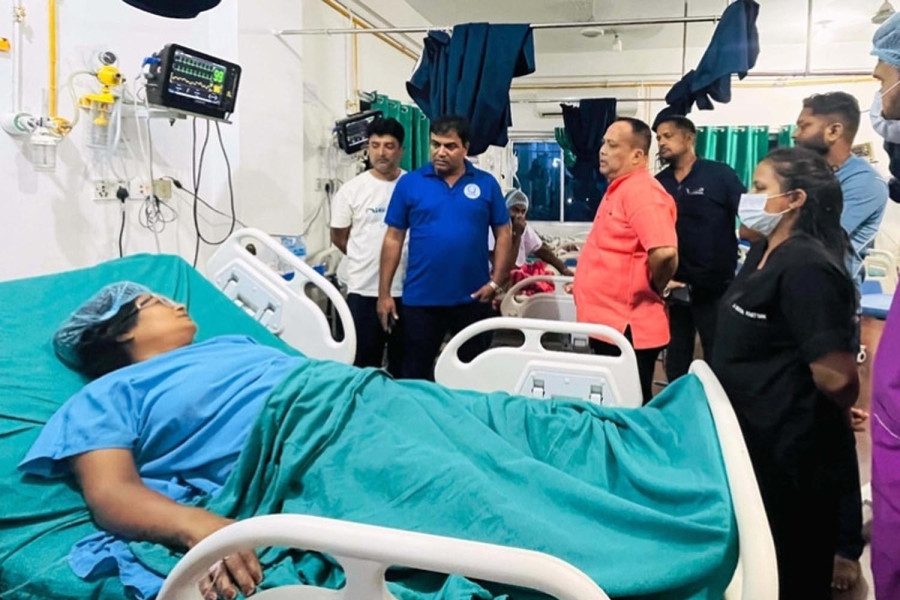Health
42 test positive in massive cholera outbreak in Birgunj
A team of experts from the WHO, health ministry, disease control division working in disease-hit areas.
Arjun Poudel
At least 42 people from various wards of Birgunj Metropolitan City have tested positive with Cholera, a highly infectious waterborne disease that has been spreading since last week.
Two people—a 35-year-old man, and a woman—died of diarrheal infection. Doctors say they were brought dead to the hospital.
The number of diarrheal patients admitted to various health facilities in the metropolis has exceeded 130, which indicates community spread of the disease.
“A 35-year-old man, who was said to have diarrheal infection, was brought dead to our hospital,” Dr Chuman Lal Das, medical superintendent of Narayani Hospital, told the Post over the phone from Birgunj. “But we have not tested his stool samples to establish the cause of death.”
Cholera is a highly infectious disease that causes severe diarrhoea and vomiting, which can lead to dehydration and death within a few hours if left untreated.
Das informed that the 73 patients with diarrhoea sought treatment at the hospital since Friday and the number continues to rise.
Health officials said they are awaiting test results from water and stool samples collected from the disease-hit areas, which have been brought to Kathmandu for laboratory confirmation.
Dr Das informed that E coli has already been detected in water samples collected from affected areas, which were tested on Saturday.
“We have sent samples of drinking water for laboratory further confirmation and are still awaiting stool culture results from patients” said Das. “Contaminated water could have triggered the diarrhoeal outbreak.”
Nepal often witnesses outbreaks of water- and food-borne diseases, including deadly cholera, during the monsoon season. Thousands of people get infected as floodwaters contaminate most of the drinking water sources.
Last year, at least 95 cholera cases were confirmed in Kathmandu, Lalitpur, Kailali, Pyuthan, Makawanpur, Rolpa, Sindhupalchok, Achham, and Rautahat districts.
The Vibrio cholera 01 Ogawa serotype was confirmed in the stool samples of infected patients.
Public health experts say that due to poor sanitation and hygiene, the country remains highly vulnerable to waterborne diseases, including diarrhoea, dysentery, typhoid, hepatitis, and cholera, especially in the monsoon season.
They say that the risk of waterborne diseases will not lessen until the country's water and sanitation conditions improve, and people are ensured safe drinking water. Several other factors, including storage conditions, supply pipes, and pollution in water sources, also impact the quality of water supplied to households.
Raju Shah, health coordinator of Birgunj Metropolis, said that people in the metropolis are being supplied water from three sources, and people using water from all three sources have been infected.
“Patients have been suffering from watery diarrhoea, vomiting, muscle cramps, dry mouth, and sunken eyes,” said Shah. “Drinking water could be the main culprit, but we cannot say which source is problematic without getting the lab results.”
Meanwhile, the Epidemiology and Disease Control Division said a team of experts comprising representatives from the World Health Organisation, Health Ministry, and the division reached Birgunj on Sunday to assist provincial and local health officials in controlling the spread of infection.
“Medicines have been supplied from the provincial health directorate, and all necessary measures have been taken to control the outbreak,” said Dr Chandra Bhal Jha, director of the division. “The expert team has started its work in close coordination with provincial and local health authorities.”
Door-to-door campaigns have been launched in disease-hit areas, mobilising medical doctors, paramedics, nursing staff, medical students, and other health workers.
“We have been running awareness drives, urging people to boil water properly before drinking, and avoid raw food brought from markets,” said Ram Jinees Chaurasia, a health worker deployed in ward 13 of the metropolis. “We have also asked people not to consume chatpate, panipuri, and other roadside food.”
The World Health Organisation says cholera is a global threat to public health, and a multifaceted approach is key to controlling the disease and reducing deaths.




 13.12°C Kathmandu
13.12°C Kathmandu















